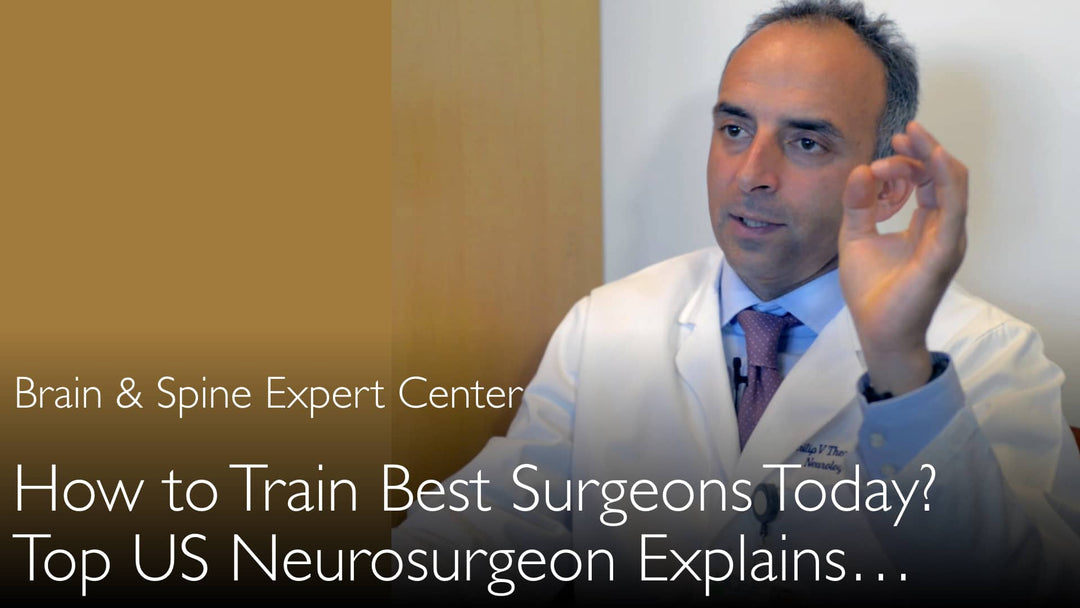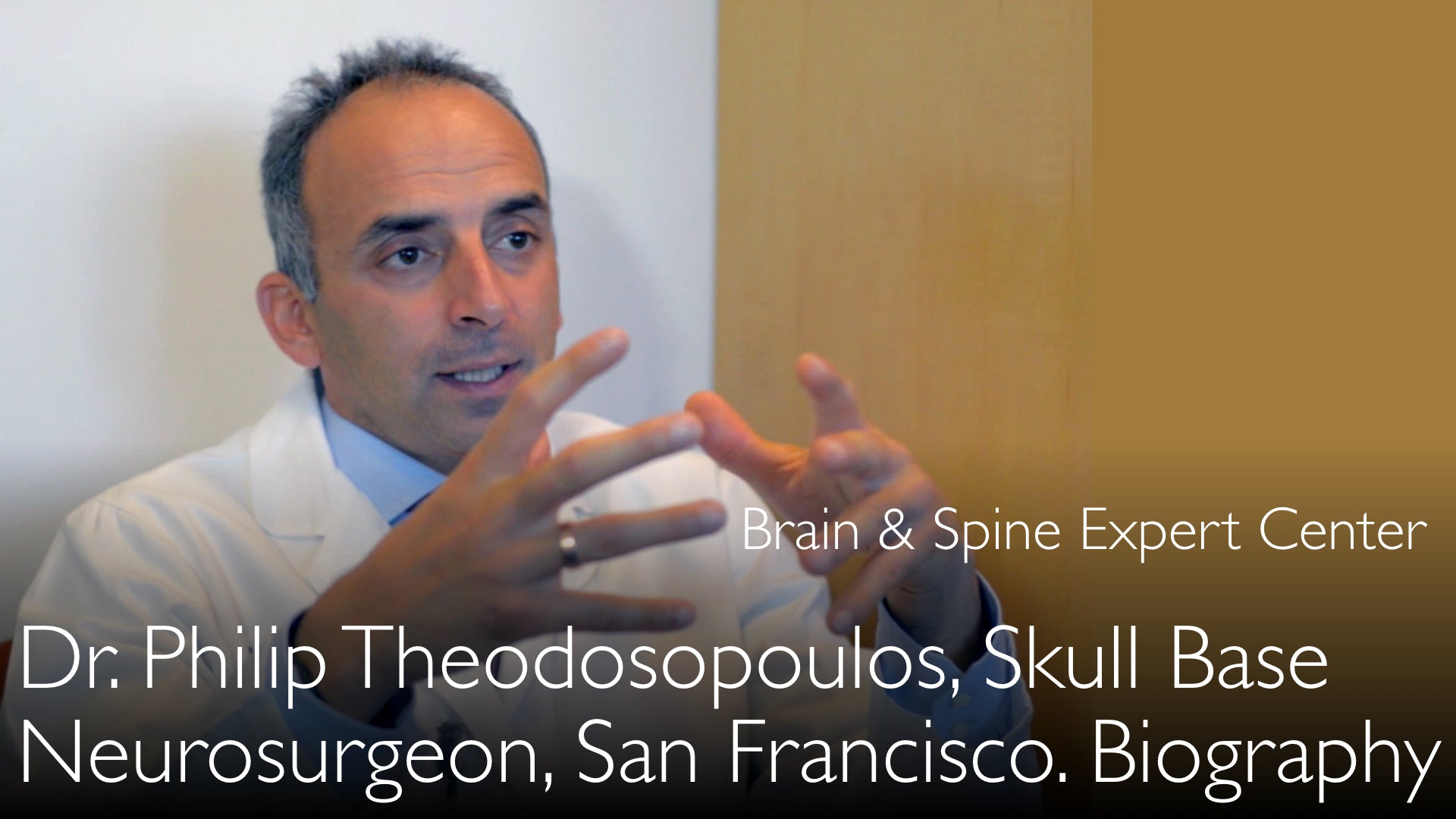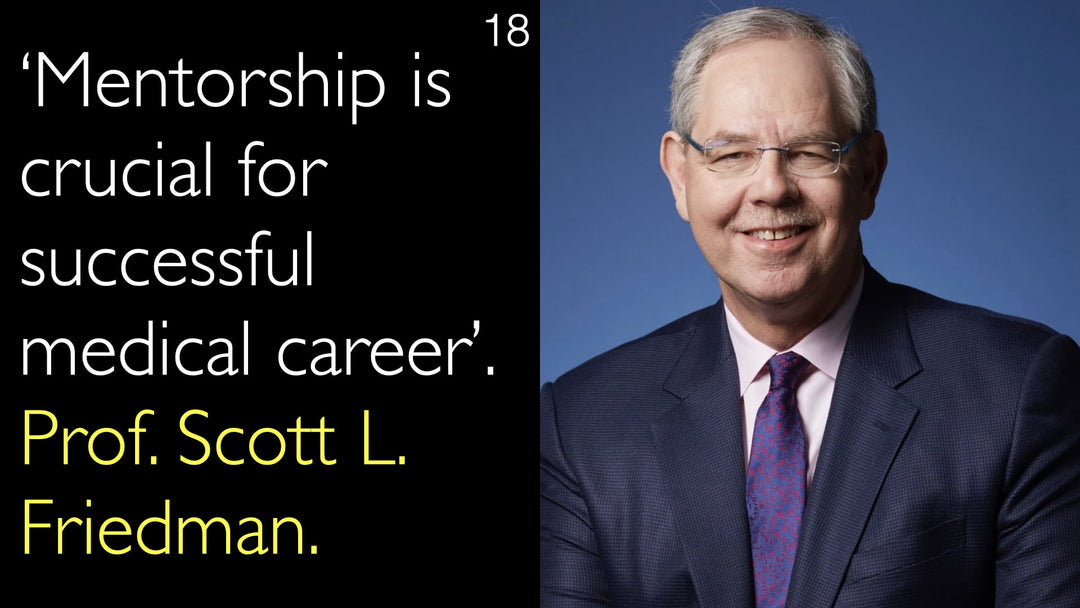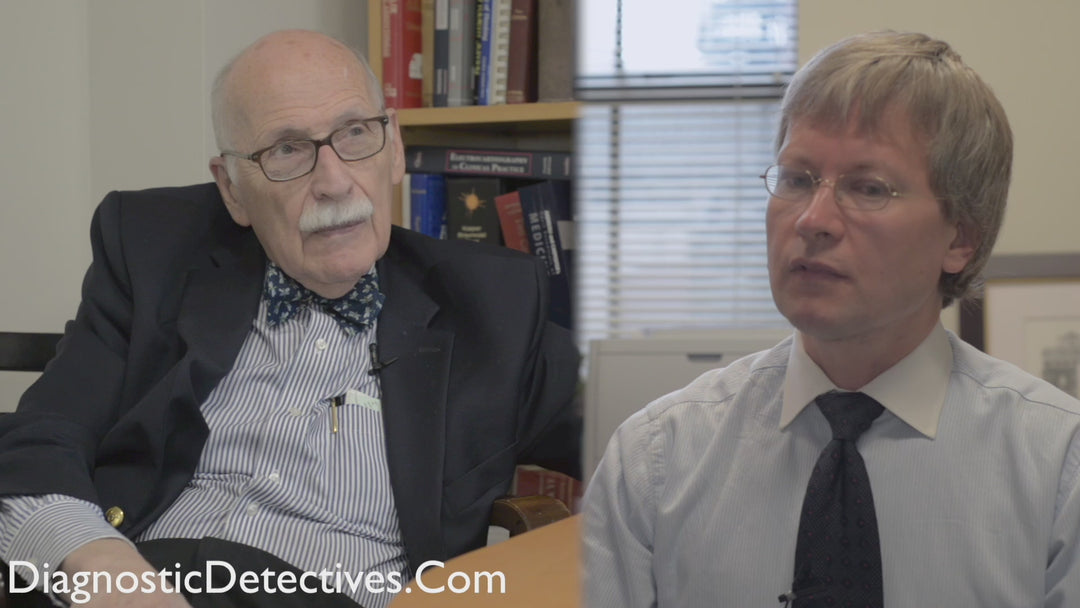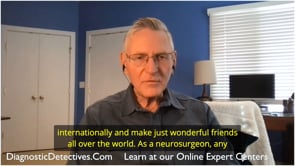Den førende ekspert inden for neurokirurgisk uddannelse og kraniebasiskirurgi, Dr. Philip Theodosopoulos, forklarer den afgørende udvikling fra den traditionelle læremestermodel til et struktureret, feedback-baseret træningsparadigme. Han belyser de gamle metoders begrænsninger, herunder færre operationstimer og en lavere patienttolerance over for kirurgiske speciallæger. Moderne kirurgisk uddannelse integrerer nu systematisk feedback, observerede operationssessioner og videoteknologi. Dr. Philip Theodosopoulos understreger behovet for at tilpasse undervisningsstilen til millenniegenerationen og forudser en fremtid med omfattende simulatortræning.
Modernisering af kirurgisk uddannelse: Fra læreplads til struktureret uddannelse
Spring til afsnit
- Begrænsninger i læremestermodellen
- Systematisk kirurgisk uddannelse
- Feedback til millenniegenerationen
- Teknologi i kirurgisk træning
- Fremtiden for simulatortræning
- Medicinsk second opinion
- Fuld transskription
Begrænsninger i læremestermodellen i moderne kirurgi
Dr. Philip Theodosopoulos, MD, peger på væsentlige begrænsninger i den traditionelle mentor-mentee-model for kirurgisk uddannelse. Selvom denne ældgamle model er grundlæggende, er den nu begrænset af færre arbejdstimer for residents og mindre tid i operationsstuen. Patienter er i dag mindre villige til at blive opereret af kirurgiske elever, og hospitaler følger kliniske resultater tæt. Disse faktorer hæmmer kollektivt kirurgisk innovation og begrænser den praktiske erfaring, der er afgørende for færdighedsudvikling.
Skiftet til systematisk kirurgisk uddannelse
En kerneudfordring er, at kirurger er dygtige praktikere, men ikke formelt uddannet som undervisere. Dr. Philip Theodosopoulos, MD, understreger nødvendigheden af at komme ud over læring gennem osmose. Hans arbejde omfattede at skabe en mere formaliseret og systematisk uddannelsesstruktur for neurokirurgiske residents. Denne tilgang fokuserer på at hjælpe kirurg-undervisere med at udvikle effektive undervisningsmetoder. Struktureret feedback er afgørende for residents udvikling og kan ikke overlades til tilfældighederne.
Dr. Anton Titov, MD, og Dr. Theodosopoulos diskuterer vigtigheden af streng træning, som eksemplificeret af mentorer som Dr. Arthur Day. Målet er at bygge uddannelsesrammer, der sikrer konsekvent, højkvalitetstræning for hver resident.
Tilpasning af feedback til millenniegenerationen
Dr. Philip Theodosopoulos, MD, bemærker, at den type feedback, som nuværende kirurgiske residents kræver, er fundamentalt anderledes. Forskning i millenniegenerationen viser, at de har brug for konstruktiv og hyppig evaluering for at forbedre sig. Den gamle norm med primært negativ feedback er skadelig og ineffektiv for moderne elever. Dette samfundsmæssige skift nødvendiggør en ny, mere støttende tilgang til kirurgisk uddannelse, der matcher, hvordan yngre kirurger lærer og udvikler sig.
Udnyttelse af teknologi til forbedret kirurgisk træning
Moderne værktøjer giver enestående muligheder for kirurgisk uddannelse. Dr. Philip Theodosopoulos, MD, fremhæver, hvor nemt det er at optage procedurer under mikroskopet til øjeblikkelig gennemgang. Denne teknologi muliggør observerede kirurgiske sessioner, hvor undervisere kan give præcis, visuel feedback. Hvad der var teknologisk vanskeligt for femten år siden, er nu øjeblikkeligt. Integration af disse værktøjer er afgørende for at maksimere træningen inden for den begrænsede tilgængelige tid.
Fremtiden for simulation i kirurgisk træning
Dr. Philip Theodosopoulos, MD, peger på simulation som den næste grænse inden for kirurgisk uddannelse. Selvom det endnu ikke er fuldt dokumenteret, vil simulatortræning næsten helt sikkert blive brugt i vid udstrækning i fremtiden. Denne teknologisk avancerede metode vil tillade residents at øve og blive dygtige med værktøjer og teknikker i et risikofrit miljø. Det repræsenterer en spændende udvikling for undervisere, der sigter mod at producere højt kvalificerede, førende kirurger.
Rolllen for medicinsk second opinion i kirurgi
Dr. Anton Titov, MD, og Dr. Theodosopoulos bekræfter den kritiske betydning af en medicinsk second opinion, når kirurgi er nødvendig. At indhente en second opinion hjælper patienter med at vælge den bedst mulige behandlingsplan for neurokirurgiske diagnoser. Denne proces sikrer, at patienter er trygge ved, at den foreslåede operation er den mest passende forløbsplan. Det er et afgørende skridt for informeret samtykke og optimal patientsikkerhed.
Fuld transskription
Dr. Anton Titov, MD: Hvordan træner man førende kirurger? Kirurgisk uddannelse fulgte en håndværker- og lærlingemodel i mange århundreder. Den unge kirurg var en lærling; den senior kirurg var håndværkeren. I dag skal kirurgisk uddannelse blive mere formelt struktureret. Mentorer skal give bedre feedback.
En førende neurokirurg fra Californien deler sin store erfaring med at vejlede unge kirurger. Hvordan forbereder man næste generation af førende kirurger? Hvordan træner man førende kirurger? Videointerview med en førende ekspert inden for neurokirurgi. Hvordan træner man de bedste kirurger.
Dr. Philip Theodosopoulos, MD: Erfarne akademiske kirurger i lederpositioner skal hjælpe kirurg-underviserne med at blive undervisere. Kirurgiske residency-programdirektører skal strukturere feedbacken til kirurgiske elever.
Dr. Anton Titov, MD: Kirurger fra millenniegenerationen kræver en anderledes tilgang til kirurgisk uddannelse. Observerede kirurgiske sessioner er nyttige for unge kirurger. At give konstruktiv og hyppig feedback til unge kirurger er vigtigt. Kirurger skal bruge moderne computerteknologiverktøjer og simulatortræning for at forbedre uddannelsen af unge kirurger.
Dr. Philip Theodosopoulos, MD: En medicinsk second opinion er vigtig, hvis kirurgi er nødvendig. En medicinsk second opinion hjælper med at vælge den bedste behandling, når en neurokirurgisk operation er påkrævet. En medicinsk second opinion vil gøre patienten tryg ved, at den foreslåede behandling er den bedste.
At blive kirurg. Hvordan træner man førende kirurger.
Dr. Anton Titov, MD: Lad os tale om neurokirurgisk uddannelse.
Dr. Philip Theodosopoulos, MD: Du har allerede berørt dette emne lidt. Det er et meget vigtigt emne. Du og jeg mødtes første gang på Brigham and Women's Hospital i Boston. Jeg var resident på det tidspunkt, og du var cerebrovaskulær- og kraniebasisfellow hos Dr. Arthur Day.
Dr. Arthur Day er en af de mest fremtrædende cerebrovaskulære og kraniebasiskirurger i verden. Jeg synes også, at Dr. Arthur Day er en fremragende underviser.
Dr. Anton Titov, MD: Han er villig til at vie så meget opmærksomhed som nødvendigt til sine residents. Så viger han yderligere tid til hver af sine residents og fellows. Vi værdsætter begge betydningen af høj kvalitet og streng træning i medicin og kirurgi.
Du har udført enestående arbejde inden for neurokirurgisk uddannelse på University of Cincinnati.
Dr. Philip Theodosopoulos, MD: Der var du direktør for neurokirurgi residency-programmet i lang tid. Så kom du til San Francisco, UCSF. Du foretog ændringer i den kirurgiske uddannelse og opnåede resultater, der blev anerkendt på nationalt plan.
Dr. Anton Titov, MD: Hvad er de afgørende uddannelsesstrukturer i uddannelsen af neurokirurgiske residents? Hvad var resultaterne af ændringerne i neurokirurgisk uddannelse?
Dr. Philip Theodosopoulos, MD: Vi sidder på mange måder fast i det gamle paradigme for uddannelse, især inden for kirurgi og alle kirurgiske discipliner. Det bringer dig til et vist punkt, men ikke videre. Hvorfor er det vigtigt?
Vi har alle levet gennem et mentor-mentee-paradigme for kirurgisk uddannelse. Vi trivedes gennem det. Det er meget vigtigt og meget effektivt. Men det gamle paradigme for kirurgisk uddannelse er blevet meget begrænset nu på grund af begrænsede timer, vi kan bruge til at træne patienter, på grund af begrænset eksponering for sygdomme og diagnoser, og på grund af begrænset tid i operationsstuen.
Der er begrænset eksponering i forholdet mellem mentor og mentee. Traditionelt blev dette erstattet af praksis. Så gik du ud i din egen kliniske praksis. Den mulighed er også blevet mere begrænset nu, fordi kliniske resultater bliver meget nøje overvåget, fordi hospitaler bekymrer sig om alle disse ting.
Patienter er mindre interesserede i at presse grænser ved at blive opereret af kirurgiske elever. Der er en potentiel risiko for, at kirurger bliver klandret for at tage risikoen ved at presse grænser i træningen, hvilket ikke skal forstås som om, at vi nogensinde sætter patientens velværd på spil. Men der er et punkt, hvor kirurgisk innovation kan blive hæmmet af overdreven tilsyn.
Kirurger er alle undervisere, men kirurger blev aldrig rigtig trænet som undervisere. Vi blev trænet som lærlinge. Nogle kirurger havde bedre rollemodeler end andre, men kirurger havde ikke en pædagogisk, formel metode til kirurgisk uddannelse.
Dette er, hvad jeg forsøgte at gøre på en systematisk måde i Cincinnati. Jeg var direktør for neurokirurgi residency-programmet. Jeg forsøgte at gøre uddannelsen mere formaliseret og systematisk. Jeg forsøgte også at hjælpe underviserne med at blive undervisere, ikke blot mentorer.
For når det kommer til at evaluere patienter, når det kommer til at give feedback til patienter, nogle gange handler det om at gøre andre bedre, er vi stadig for afhængige og til skade af læremestermetoden til kirurgisk residenttræning. "Se på mig og lær gennem osmose." Det betyder ikke, at vi skal have residents til at udføre operationerne, og vi ser på.
Det er ikke præcis, hvad jeg siger. Men medmindre vi kan strukturere den feedback, vi giver til patienter, kan vi ikke fuldt ud lykkes. Nogle gange under træningen var feedback altid negativ.
Dr. Anton Titov, MD: Du ønskede ikke nogen feedback. I gamle dage var det den accepterede metode, normen. Men nu har vi at gøre med millenniegenerationen. Vi har foretaget meget forskning om millenniegenerationen i min tidligere rolle som fokuseret underviser.
Jeg kan fortælle dig, at den type feedback, som kirurgiske residents nu kræver og har brug for for at forbedre sig, er meget forskellig fra, hvad vi krævede eller havde brug for. Det er samfundsmæssigt, i hvert fald i USA og overalt. De værktøjer, vi bruger, bør være anderledes, og helt ærligt, nu har vi teknologien til at gøre det.
Vi havde indført observerede kirurgiske sessioner, hvor vi ville evaluere nogen i det.
Dr. Philip Theodosopoulos, MD: Nu er det så nemt for mig at optage dig, mens du opererer under mikroskopet, og vise det for dig på computeren. Det er morsomt, vi siger dette til patienter nu. Så ser de på dig, som om du har to hoveder. Men for femten år siden var det ikke engang muligt. Nogle gange ville du, men du kunne ikke gøre det. Nu er det en lille knap, du trykker på, og du smider bare videoen ind i din computer på et øjeblik.
Dr. Anton Titov, MD: Nogle af ændringerne i kirurgisk træningstilsyn og strategi er teknologiske. Nogle ændringer er systematiseret, fordi medmindre du gør det, er der ikke nok timer i døgnet nu til blot at træne patienter osmotisk. Nogle af ændringerne i kirurgisk træningsbehandling er relateret til øget konkurrence.
Der er mange flere patienter, der gør mange flere ting nu.
Dr. Philip Theodosopoulos, MD: Kirurger skal virkelig sortere i de gode kvalitetspatienter. Du skal give dem disse værktøjer. Kirurger kan ikke forvente, at yngre kirurger bliver dygtige af sig selv. Unge kirurger kan ikke øve og blive dygtige til at bruge værktøjerne med det samme, fordi de ikke får den praksis før ret sent i deres egen erfaring.
Det er et meget interessant og spændende felt inden for kirurgisk uddannelse. Vi har ikke engang berørt de mere teknologisk avancerede metoder, der endnu ikke er helt dokumenterede.
Næsten helt sikkert vil simulation af kirurgiske operationer blive brugt i vid udstrækning i fremtiden. Men det er den slags metoder, vi vil bruge til at træne patienter i fremtiden. Det er spændende for os alle som undervisere.
Dr. Anton Titov, MD: Hvordan trænes førende kirurger. Videointerview med en førende ekspert i neurokirurgi. Hvordan vejledes unge kirurger korrekt? Læretid eller struktureret feedback?


